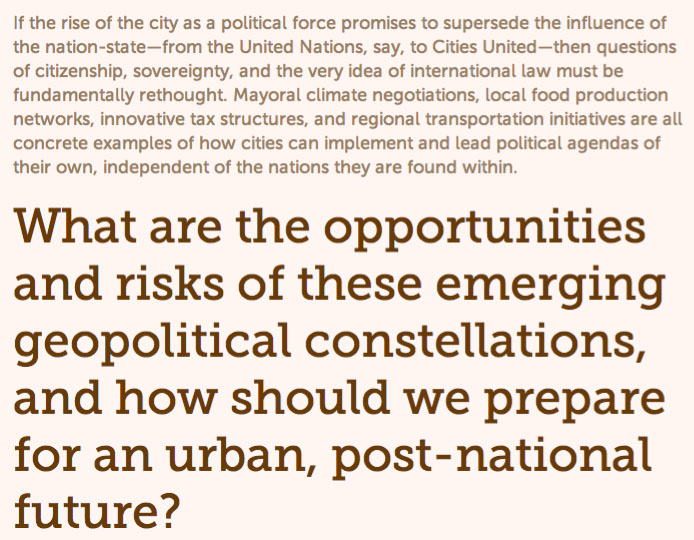There are still a few hours—lasting till 8pm EST today—to participate in this week’s Glass House Conversation on the political future of cities.
 The comments have really hit on some great and very wide-ranging points, including, but by no means limited to, thoughts from Enrique Ramirez, Nicola Twilley, Matthew Battles, Ana María León, and David Gersten. The city as legal actor; the city as myth, described by Italo Calvino; the city as historical environment shaped by the proportions of the human body; the urban slum as a radically privatized development.
The comments have really hit on some great and very wide-ranging points, including, but by no means limited to, thoughts from Enrique Ramirez, Nicola Twilley, Matthew Battles, Ana María León, and David Gersten. The city as legal actor; the city as myth, described by Italo Calvino; the city as historical environment shaped by the proportions of the human body; the urban slum as a radically privatized development.
Being the host of the discussion this week, I would love to see a flurry of activity there in the last few hours; at 8pm EST tonight, it’s all over!
Coincidentally, Foreign Policy‘s most recent issue proclaims that “The age of nations is over. The new urban age has begun.” Perhaps skim that article on your way over to the Glass House Conversations, and then feel free to chime in.
Phew! Thanks for the reminder, just caught it, although not in the kind of depth & detail I orginally wanted. We should proabbly all be thankful for that …
Perhaps there was never an "age of nations" at all. 🙂
Excellent reference to Italo Calvino. I was lucky enough to give my extremely written upon copy of Invisible Cities to Carol Coletta (of Smart City with Carol Coletta) when I interviewed her in Chicago, 2009.
Bah, missed the conversation, but there is something about this topic that I'm curious about.
On the surface of it, Australia is far along this path. We're arguably the most urbanised nation, with the huge majority of our population and economic production concentrated in just 5 or 6 urban centres. Politically it is becoming harder to distinguish between state and city politics: in each of our states anything from 75% to 90% of the population is in the capital city; indeed there's an old joke that when Melbournians say "Australia" the mean Australia, but when Sydney-siders say "Australia", they really mean Sydney.
But for all this, the success of the Australian economy and of its cities are largely underpinned by the vast mineral wealth being generated in places that are very remote from the cities themselves. Starting from similar conditions 30 years ago, Perth and Brisbane have seen growth at a far greater rate than Adelaide largely because of the rapid expansion of their state's mining industries. South Australia, in turn, is hoping for a similar cycle out of the world's largest uranium deposit at Olympic Dam, some 560km north of Adelaide.
In this "post-national future", what is the relationship of the new super-cities to the resources necessary for their existence? In the absence of nations, what is it that connects Perth to Tom Price, Houston to Deepwater Horizon, or Santiago to the San Jose Mine? Or is the role of the nation reduced to just enforcing the laws of contract and property that maintain the cities' ownership of their distant honeypots?
okay…it's a Dissertation Proposal Writing night (read what you will into that)…i have only a mild recommendation to make (please forgive my lack of pointed clarity / actual addition to the conversation):
http://faculty.washington.edu/sparke/S.pdf